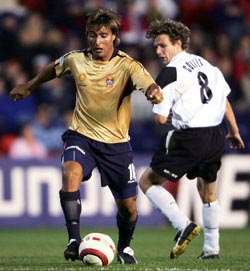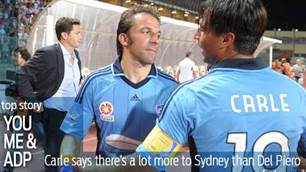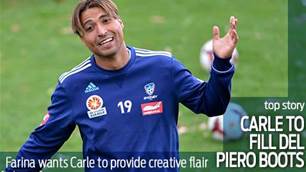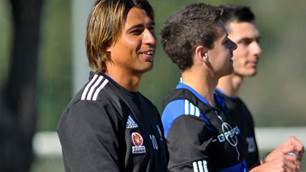He’s one of the most gifted players in the country but Nick Carle’s persistent snubbing by Socceroo coaches remains a mystery. Aidan Ormond tracks the Newcastle No.10’s roller-coaster career
Page 2 of 3 | Single page
Carle didn’t disappoint on October 5, 1997 when he made his senior debut as a 15-year-old. It was the Sydney NSL derby between traditional rivals Olympic –featuring a teenage Brett Emerton – and Marconi. It was dire, fourth division fare played on a terrible surface in front of just 7,007 at Aussie Stadium. It was “old football” at its worst. However, the arrival of Carle lit up the game when he was thrown on as a sub in the 75th minute.
His match winner in injury time was a thing of beauty. The Marconi defence failed to clear a ball on the edge of the box. Carle collected the ball with his left peg, swivelled and hit it cleanly past 2006 Socceroo squad keeper Ante Covic. It was a helluva way of introducing yourself – it even made
Channel 7’s sport report – but Carle is less enthusiastic about reliving this spectacular launch to his senior career.
“You probably remember it better than me!” he laughs. “It was a long time ago. I don’t like it being mentioned too much as a lot of people remember my career for that one goal and there’s been more to my career than just that. It was a good way to start but there were a lot of expectations after that.”
In hindsight, a move to the AIS – our nation’s finest finishing school for young footballers – is what Carle would have preferred following the flurry of interest.
“I think at 15, I was probably at a higher level than most players of my age,” he admits. “I think going to the AIS would’ve been better for my career than playing at Sydney Olympic.
“I saw a big improvement in players who went to the AIS. They were playing regularly. While at Sydney Olympic, for the next two years I was coming on for 15 minutes here and there. Which basically meant I trained for two years. I think I lost a lot.”
However, one by-product of success was that Carle was earning as much as most of his high school teachers. “I was still in school and whenever we got our win bonus it was $600-$800 in my pocket. For a school kid, I was over the moon!”
It’s frightening to think how much better Carle could’ve been if he had gone to the AIS rather than stay in school – he admits his right foot is only good for “stepping onto buses” while his finishing needs improving.
“I was known as a ‘super-sub’ which wasn’t something I liked and it wasn’t good for my career. I think it did slow up my progress,” reflects Carle, who grew up in the west of Sydney, one of Australia’s most fertile football areas.
Kimon Taliadoros played with Carle at Sydney Olympic in the late 90s. “I was amazed at Nick’s command of the ball and his ability,” says the one-time South Melbourne forward who played nine times for Australia. “Both Nick and [his brother] Leo were good, but particularly Nick.
“His speed of footwork was excellent. Moreover, he had a good character. He was determined but also respectful of the game and his teammates. He was only 15, but he was good enough to play in the first team.
“At 24, he’s probably still completing his football apprenticeship. I’ve no doubt he can excel at the highest level. He is one of the best ever to come out of Australia. With the right coaching he has all the basic ingredients you need for success.”
After five seasons with Olympic, Carle was developing into a rare talent. Leading French coach Alain Perrin came to the same opinion after he saw Carle trial with his French Ligue One side Troyes in early 2002. The move to France began very brightly, as Carle explains.
“Once I got there Alain Perrin, who personally signed me, kept saying, 'Where’s your visa?' which was a good sign. I trained for two weeks with the first team. I was lucky, a few players were at the African Nations Cup, so I got a chance.”
Carle was a fan of his new coach, too. “He was unbelievable, but I wasn’t surprised he didn’t do well in England [at Portsmouth last year he lasted eight months]. It doesn’t suit the style of football he liked. He took Troyes from the fourth division to first division in six years and then kept them there for three seasons. And the year he left, they dropped back down.”
His match winner in injury time was a thing of beauty. The Marconi defence failed to clear a ball on the edge of the box. Carle collected the ball with his left peg, swivelled and hit it cleanly past 2006 Socceroo squad keeper Ante Covic. It was a helluva way of introducing yourself – it even made
Channel 7’s sport report – but Carle is less enthusiastic about reliving this spectacular launch to his senior career.
“You probably remember it better than me!” he laughs. “It was a long time ago. I don’t like it being mentioned too much as a lot of people remember my career for that one goal and there’s been more to my career than just that. It was a good way to start but there were a lot of expectations after that.”
In hindsight, a move to the AIS – our nation’s finest finishing school for young footballers – is what Carle would have preferred following the flurry of interest.
“I think at 15, I was probably at a higher level than most players of my age,” he admits. “I think going to the AIS would’ve been better for my career than playing at Sydney Olympic.
“I saw a big improvement in players who went to the AIS. They were playing regularly. While at Sydney Olympic, for the next two years I was coming on for 15 minutes here and there. Which basically meant I trained for two years. I think I lost a lot.”
However, one by-product of success was that Carle was earning as much as most of his high school teachers. “I was still in school and whenever we got our win bonus it was $600-$800 in my pocket. For a school kid, I was over the moon!”
It’s frightening to think how much better Carle could’ve been if he had gone to the AIS rather than stay in school – he admits his right foot is only good for “stepping onto buses” while his finishing needs improving.
“I was known as a ‘super-sub’ which wasn’t something I liked and it wasn’t good for my career. I think it did slow up my progress,” reflects Carle, who grew up in the west of Sydney, one of Australia’s most fertile football areas.
 |
| Another defender left in his wake... |
Kimon Taliadoros played with Carle at Sydney Olympic in the late 90s. “I was amazed at Nick’s command of the ball and his ability,” says the one-time South Melbourne forward who played nine times for Australia. “Both Nick and [his brother] Leo were good, but particularly Nick.
“His speed of footwork was excellent. Moreover, he had a good character. He was determined but also respectful of the game and his teammates. He was only 15, but he was good enough to play in the first team.
“At 24, he’s probably still completing his football apprenticeship. I’ve no doubt he can excel at the highest level. He is one of the best ever to come out of Australia. With the right coaching he has all the basic ingredients you need for success.”
After five seasons with Olympic, Carle was developing into a rare talent. Leading French coach Alain Perrin came to the same opinion after he saw Carle trial with his French Ligue One side Troyes in early 2002. The move to France began very brightly, as Carle explains.
“Once I got there Alain Perrin, who personally signed me, kept saying, 'Where’s your visa?' which was a good sign. I trained for two weeks with the first team. I was lucky, a few players were at the African Nations Cup, so I got a chance.”
Carle was a fan of his new coach, too. “He was unbelievable, but I wasn’t surprised he didn’t do well in England [at Portsmouth last year he lasted eight months]. It doesn’t suit the style of football he liked. He took Troyes from the fourth division to first division in six years and then kept them there for three seasons. And the year he left, they dropped back down.”
Related Articles

Carle: There's more to Sydney than ADP

Carle to fill Del Piero's boots













